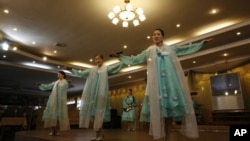North Korean restaurants are offering a rare glimpse to the country's reclusive culture by growing its network in major Southeast Asian cities. The restaurants, bearing the brand name Pyongyang after the capital city of North Korea, are serving everything from cold noodles to quirkier dishes such as dog meat casserole.
At first, the establishments catered to South Korean businessmen in the region. But in recent years, they have seen an increasing number of tourists and locals craving Korean cuisine.
In Siem Reap, Cambodia, the Pyongyang restaurant, the first opened in Southeast Asia, is a hit among Asian tourists, especially those from South Korea, China and Japan.
Waitresses exchange elegant smiles and occasionally make small talk with customers as they pour wine into dainty cups and serve thinly-sliced barbecued pork meat on white porcelain plates to restaurant patrons.
The main dining hall, which can seat 400 guests at a time, is usually full for dinner as busloads of tourists arrive at the restaurant for an authentic North Korean meal after a long day at the ancient temples of Angkor Wat.
In Siem Reap alone, there are two North Korean restaurants, the first established in 2002. Since then, Pyongyang restaurants have opened in other cities including Phnom Penh, Bangkok, Kuala Lumpur and Singapore.
A Pyonyang staff member in Siem Reap said the restaurants are managed by companies linked to the North Korean government, while the staff is recruited by similar agencies.
The Pyongyang restaurants are said to operated by the North Korean government to as a source of foreign currency.
Wearing traditional, knee-length turquoise Korean handboks, the ivory-skinned waitresses whisk in and out of the kitchen carrying platters of Korean cuisine. Later they trade in their traditional costumes for Western-style dresses and tap-dance shoes to perform while customers enjoy their meals.
A 22-year old waitress, trained in culinary studies, who wanted to remain anonymous, explained that all the waitresses have undergone some form of training in dance and music schools, apart from studies in college. She explained that working abroad at the Pyongyang restaurant was a management trainee exercise and the staff would generally rotate every three years.
While the waitresses do not openly praise North Korean founder Kim Il-Sung or present leader Kim Jong-Il. Nonetheless, the business sends a subtle message that North Korea is a happy and blessed country, as seen by large paintings of tigers, snow-capped mountains and abundant fruits hanging from its trees don the restaurant, while videos of beautiful scenery in North Korea.
Dubbed as “The Hermit Kingdom” for its reclusive policy, life in North Korea, is rarely seen in the public eye. Few have access to the country, let alone have any interactions with North Koreans, inside or outside of the country.
To many of the tourists having a meal at the Pyongyang restaurant, the experience of dining among North Koreans is a novelty. The reclusive country is frequently accused of serious human rights abuses. But in the Pyongyang restaurant, the country is going to great lengths to have foreigners see a different side of North Korea.
A customer from Seoul, who only wants to be known as Mr Lee, says this is his first time in a North Korean restaurant. He is surprised by the impeccable service and the waitresses entertaining performances. Mr. Lee said,“this is definitely an interesting experience for me, especially since I have read about the North Korean regime and it is so different in here from what I have previously read about."
Pyongyang Restaurants Extending Reach in Southeast Asian Cities
- Yong Nie




